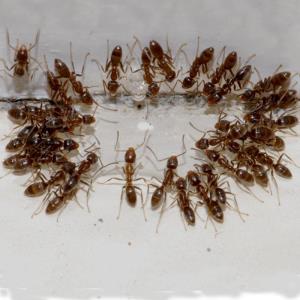Top-Rated Termite Control Services: Guarantee Long-Term Security for Your Home
Top-Rated Termite Control Services: Guarantee Long-Term Security for Your Home
Blog Article
Ecological Impact of Bug Control: Balancing Efficiency With Sustainability
The environmental influence of bug control is a vital issue that calls for a fragile balance in between accomplishing performance in handling insects and ensuring sustainability of our communities. From the use of harmful chemicals that permeate right into our soil and water to the unexpected effects on non-target varieties, the effects of conventional parasite control techniques are far-reaching.
Dangerous Chemicals in Bug Control
The utilization of damaging chemicals in pest control presents significant ecological and health dangers that warrant careful consideration and mitigation methods. Herbicides, chemicals, and pesticides are typically used to get rid of pests, but their extensive application can bring about unintended repercussions. These chemicals can pollute soil, water resources, and the air, influencing not only the targeted bugs however additionally advantageous insects, wild animals, and humans.

To address these risks, incorporated bug monitoring (IPM) techniques are being promoted as a much more sustainable alternative. IPM includes a mix of approaches such as biological control, environment adjustment, and the targeted use pesticides as a last hope (ant control davidson nc). By embracing an alternative strategy to pest control, we can minimize the ecological and health effects related to hazardous chemicals while efficiently managing pest populations
Effect On Non-Target Types
Considering the unplanned repercussions of parasite control methods, the impact on non-target species is a crucial facet that needs complete examination. While bug control procedures aim to target certain bugs, various other organisms in the community might be accidentally affected. Non-target species, including valuable pests, birds, creatures, and also plants, can suffer straight or indirect harm from pesticide applications or organic control approaches.
Pesticides made to combat a specific bug pest might damage pollinators like or all-natural predators such as ladybugs. Organic control representatives, if not species-specific, can pose dangers to unintended targets, interfering with the eco-friendly balance.
To reduce the influence on non-target types, incorporated insect administration (IPM) methods that stress an all natural method to pest control are suggested. These methods focus on making use of eco-friendly techniques, decreasing injury to beneficial microorganisms while successfully handling pest populaces. Conducting complete risk analyses and checking the results of insect control initiatives are vital steps in safeguarding non-target types and advertising general ecological community health.
Soil and Water Contamination
Unplanned environmental effects of bug control techniques extend beyond influencing non-target species, with substantial ramifications for dirt and water contamination. Chemicals, herbicides, and chemical plant foods utilized in pest control can leach right into the soil and pollute groundwater, positioning a threat to both marine and terrestrial ecosystems. Soil contamination can interfere with the balance of bacteria essential for nutrition biking and plant development, leading to lowered soil fertility and performance. These chemicals can persist in the setting for extended periods, collecting in the soil and possibly going into the food chain.
Water contamination is another vital issue linked with pest control methods. To minimize soil and water contamination from pest control activities, incorporated parasite monitoring approaches that focus on sustainability and decrease chemical inputs are essential.
Air Contamination From Pesticide Usage
Exposure to airborne pesticides throughout agricultural applications poses a considerable issue for air pollution control steps. Furthermore, pesticide drift, where chemicals are carried by the wind to unintended areas, can lead to the contamination of nearby ecological communities and water bodies.

Methods for Sustainable Pest Control
In the realm of agricultural methods, applying sustainable insect control methods is vital for keeping eco-friendly equilibrium and securing crop yields. Sustainable bug control stresses the use of eco friendly approaches to take care of bug populations properly while minimizing harm to non-target microorganisms and ecological communities. Integrated Parasite Monitoring (IPM) is a widely embraced strategy that combines biological, cultural, physical, and chemical control approaches to accomplish long-term bug monitoring options.
One trick approach in sustainable bug control is advertising biodiversity within agroecosystems. By enhancing natural adversaries of parasites, such as predators and parasitoids, farmers can decrease the requirement for synthetic pesticides. Plant turning and diversity are additionally reliable methods to interrupt pest life cycles and create less beneficial problems for pests to prosper. Furthermore, using pest-resistant plant varieties and employing strategies like catch cropping can assist decrease pest pressure without relying greatly on chemical interventions. Inevitably, by integrating these sustainable pest control techniques, farmers can attain an equilibrium in between pest administration efficiency and environmental stewardship.
Final Thought
In verdict, the ecological effect of bug control techniques should be very carefully taken into consideration to stabilize efficiency with sustainability. Unsafe chemicals utilized in pest control can lead to dirt and water contamination, air contamination, and damage non-target types - ant control. It is critical to apply lasting insect control strategies to reduce these negative results on the setting and promote a much healthier community for ant control raleigh nc future generations
By embracing a holistic method to pest control, we can decrease the environmental and health and wellness effects connected with harmful chemicals while effectively managing pest populaces.

To reduce the air pollution caused by chemical use, it is vital to adopt incorporated pest management techniques that prioritize the usage of non-chemical parasite control methods, such as plant turning, natural killers, and immune crop varieties. Lasting insect control highlights the usage of eco friendly techniques to take care of insect populations properly while reducing injury to non-target organisms and communities. Integrated Pest Administration (IPM) is a commonly adopted approach that combines organic, cultural, physical, and chemical control methods to accomplish lasting insect administration solutions.
Report this page